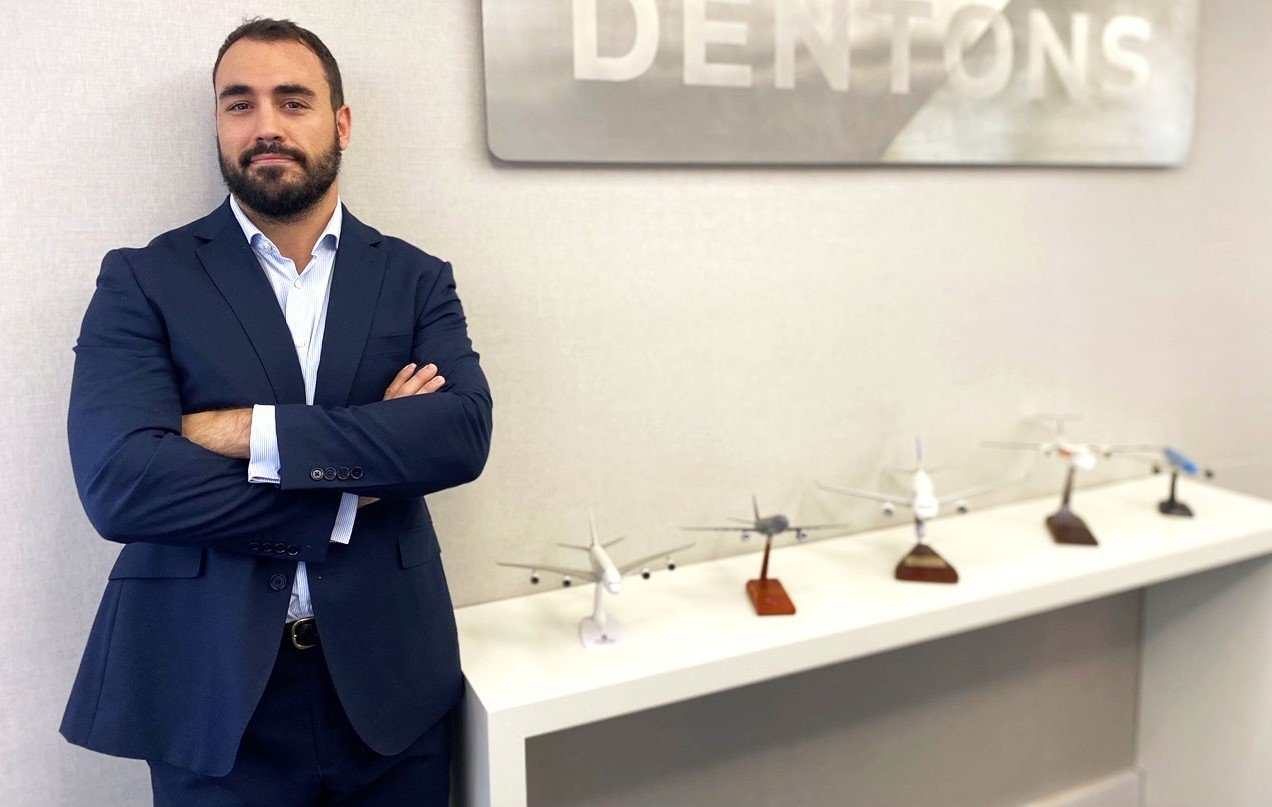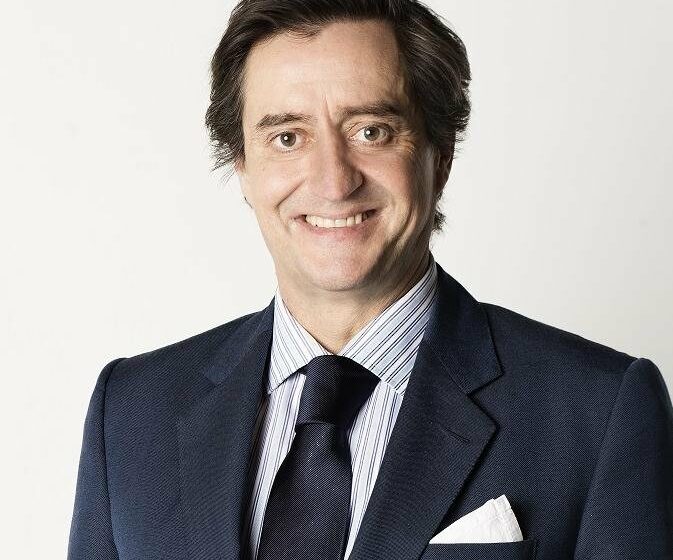Ignacio Fernández, Dentons´ high-flying lawyer

Ignacio Fernández is the Dentons’ dolphin in the field of Aviation Law, specifically in all matters relating to Aircraft Finance, his speciality. He proudly acknowledges that he belongs to a pioneering team in these matters, which is currently led by his colleagues Jabier Badiola and Luis Belart. At the age of 30, he has already been part of very important matters in this sector and shows himself as a brilliant, constant and non-conformist young man who lives each day as an opportunity to consolidate his knowledge and continue to grow.

Is your speciality, Aircraft Finance, more Aviation Law or Financial Law?
Like other sub-areas of Financial Law (e.g. project finance in the energy sector), understanding the regulatory component is essential to be able to give correct advice on a transactional level.
It is not possible to advise on one without knowing the other.
Risk coverage in financing, for example, to acquire an aircraft is usually linked to the value of the aircraft and the generation of cash flows from its operation and, therefore, involves obtaining collateral on these two sources of value. If you don’t understand how the international rules on security interests in mobile equipment (regulated by the Cape Town Convention on International Interests in Mobile Equipment, 2001) or the national rules on aircraft (Air Navigation Act or the operation of the Aircraft Registration Office or the Movable Property Register) work, it is impossible to give proper advice.
Why did you decide to study Law and specialise in this niche? Why did you choose to become a lawyer in a law firm and why precisely at Dentons?
Ever since I was a child, I have always enjoyed arguing and debating, always playing devil’s advocate and refuting the argumentation of everything. I have always had in mind that nothing is black and white, but that it depends on the prism from which you look at it and, above all, on how you argue each idea. My university future was clear to me: a double degree in Law and business administration and management. And once in the Master’s degree, the Business Administration component totally tipped the balance for me to specialise in Financial Law.
I have to admit that until I did my Master’s degree, I was totally unaware of the existence of the practice of aircraft finance. However, once I discovered it, I was fascinated by it, so I started to look into it on my own.
Why a lawyer in a law firm? I think what captivated me the most was how the transactional areas worked in these firms ̶ the frenetic pace and the executive mentality needed to be able to carry out the huge transactions, involving practices, firms and countries.
Why Dentons? Dentons offered me three things that I had written down in a “Letter to the Santa”: on the one hand, an international law firm in full growth that was starting to bet strongly on the Spanish market, and that after big signings was starting to look at internal careers and development.
On the other hand, when I joined, it was the perfect size, we all knew each other, the famous horizontality was real, it was not an oversized office where you are just another computer in a meadow of juniors and trainees.
Finally, and the icing on the cake for someone who has always had a passion for planes, helicopters, ships, etc., there was a specialised asset finance department, led by Jabier Badiola and Luis Belart, who had opened the practice in their previous office and have been dedicated to aircraft and ships for more than a decade.
Do you remember what your first case related to the aeronautical sector was?
Of course, it was June 2016. I had just joined the firm when the team was sent to carry out a structured financing transaction for the acquisition of an Airbus A330-300 aircraft to be operated by a well-known Spanish operator.
The particularity of this transaction was that it was the first transaction in Spain with all documentation subject to Spanish Law (usually much of the documentation is subject to English Law) that would be governed by the recently ratified (1 March 2016) Cape Town Convention.
The application of the convention radically changed practice, as it implemented a new system of international guarantees, international registration, the so-called AEP codes, which replaced the procedure used in Spain to date.
It was the first time that jargon such as AEP Codes, IDERAs, PUE, TUE, etc., was used in Spain. The surprising thing was how Jabier and Luis dealt with these regulations as if they had been working with them all their lives, while the rest of the parties were totally unaware of how they worked.
It was exciting because when I discussed this afterwards with people in the sector, such as officials from the State Aviation Safety Agency, the Register of Movable Property, and even a Professor of Public Law, I realised that in some way I had been part of a pioneering team in the sector.
What do you remember as your greatest learning experience? What has been the most difficult part of this process of specialisation: adapting to the language of engineers, applying the Law of different jurisdictions, adapting to the regulations of different bodies (national and international), Compliance…?
As you say, specialisation in the aircraft finance sector requires a certain knowledge of aeronautical matters, registration regulations and regulatory procedures, which are not exactly the most captivating part of the sector. On the other hand, there is a more attractive part, such as knowing the aircraft or helicopter models, having access to plans, photographs, etc., which perhaps makes it more tangible than other internships.
My biggest learning experience was undoubtedly the Cape Town Convention, its Protocol and the international assurance mechanism of the International Aviation Registry. As I mentioned before, my entry into the sector coincided with the entry into force in Spain of the Cape Town Convention, which I had to study intensively.
The Convention meant a 360-degree change in the sector. Practically everything ceased to be regulated by national legislation and came to be governed by international regulations, which were not even developed in Spain (sometimes even contrary to Spanish legislation), and of course, with no precedent or jurisprudence to rely on.
The most difficult part was to assimilate and understand the operational and regulatory functioning of the State Aviation Safety Agency and the different registries. This would not have been possible had it not been for the enormous good fortune of having Luis Belart as a mentor, who made available to me all his years of specialisation in the world of aviation law.
What types of transactions does the Banking and Finance department handle in relation to Aviation Law? What characteristics would you say they have in common? Which ones do you recall as being the most complex, and how did you manage to overcome the main pitfalls you encountered along the way?
We undertake all types of transactions, from financing for the acquisition of fleets or individual aircraft, fleet restructurings, sale and purchase, finance and operating leases, securitisations, etc.
We have recently published a transaction in which we have advised the Eliance Group, an operator of rescue, fire and civil protection services, on the restructuring of their fleet to make it all Cape Town compliant and the restructuring of the group’s debt.
The common feature of all these operations is the underlying aviation business. In all of them, the hedging of the risk is ultimately based on the aircraft, either as a cash-flow generator (the lease rentals) or as a transferable asset in the event of foreclosure (the value of the asset itself).
Undoubtedly, the most complicated operation was, as I mentioned before, in June 2016, when we carried out the first operation in Spain that would be governed by the Cape Town Convention, and which would involve implementing the Convention. In particular, I would highlight the difficulty of drafting from scratch a CTC Security Agreement (international security agreement governed by the Convention) and registering the international interest arising therefrom in the international registry of movable assets. We were starting from scratch and had nothing to rely on but the literal wording of the Convention.
It was as hard as it was exciting!
What have been the cases that you count as the greatest achievements of your career so far?
Since joining the firm, we have advised several banking syndicates formed by Spanish commercial banks on several financing transactions for a cumulative amount in excess of €500 million, for the acquisition of 8 Airbus A330 aircraft to be operated by a major Spanish airline.
As I mentioned before, we have recently advised the Eliance group (one of the main operators of rescue, fire and civil protection services in Spain), in the restructuring of the fleet and the restructuring of the group’s debt. This operation is a global operation worth approximately €170 million, which addressed different aspects of aircraft finance: from the corporate restructuring of the group, the operational restructuring of the fleet in order to comply with the requirements of the Cape Town Convention, to various bond issues to restructure the group’s bank debt and also allow the group to carry out the purchase of new aircraft.
Outside of aircraft finance, highlights include the corporate restructuring and refinancing of the worldwide debt of the Toys “R” Us group, the restructuring and refinancing of the Sando group, a major Spanish construction group, several acquisition financings and subsequent restructuring of the bank debt of the Atenoil Group, and an infrastructure project bond to finance the construction of a toll road.
The specific studies to become a specialist in Aviation and Aerospace Law are relatively recent. Would you recommend specialisation to other young lawyers who may be reading this interview? What pros and cons do you find?
It is difficult to foresee how the pandemic will affect us and the permanent consequences it will have, among others, in the aeronautical sector.
The trend in the legal sector, prior to COVID, is towards super-specialisation. In London, for years now, large law firms have had entire departments made up of dozens of specialised lawyers dedicated exclusively to aircraft finance, and even within these departments, there are subdivisions depending on the type of product or type of aircraft.
It would be logical to think that, as on so many other occasions, London sets the trend and therefore we should also end up with very specialised departments.
In this sense, today it is certainly not like Luis tells me it used to be: network operations with a regulatory component that only those who wanted to get into that niche could do.
In my opinion, today it is a fully-fledged area, very attractive and a very important source of income for some firms, where the local lawyer is becoming more and more important, and perhaps London or New York less so.
My specialisation was based on individual effort guided by two experts in the field who had already studied the Convention and knew the sector in depth. Without them, I would certainly have needed a specific aircraft specialisation programme to do what I do today.
Therefore, the specialisation courses are highly recommended for anyone who wants to start in this area.
The economic data shows that Spain is a good market for this industry. Has the pandemic affected these operations?
Without a doubt, the civil aviation sector has been greatly affected by the pandemic. Fear together with mobility restrictions and various measures put in place by different organisations have had a brutal impact on the sector.
According to data from IATA (International Air Transport Association), as a result of the pandemic, there has been a huge reduction in air traffic. Specifically, in March 2020, there was a 55% reduction in the number of commercial flights compared to the same period the previous year.
This affects the entire aviation industry chain, from airlines or airports to manufacturers or asset holders and, of course, consultants.
However, it is also a time of opportunities, fleet restructurings, discounted purchases, renegotiation of fleet leases, etc.
As I said, we have gone from buying to increase fleets to restructuring them; there is always work to be done in the sector.
Have you ever considered working in-house for a company?
No, I haven’t considered it at the moment. I think the most important thing right now is to focus on learning, and for that, there is no better office and no better team than where I am.
How would you like to continue your career, what are your next steps, what challenges are on the horizon?
The world of law firms is a fast-changing one. It is difficult to predict the long term. I prefer to focus on the day-to-day, gradually building knowledge and acquiring skills that will allow me to be a good professional in the future, wherever I go.
What are my next steps? As I mentioned before, I consider it essential to continue training, and not only in the legal field.
On the other hand, the epicentre of the aviation industry is London, as the hub of the industry’s major operations, and Dublin as the home of the vast majority of aircraft owners I believe that a secondment in the aircraft finance department of one of these offices would be a necessary step in my career in order to fully immerse myself in the industry.
I have also been thinking for some time that I would like to take on the challenge that an MBA can offer, which would allow me to offer greater value to clients, with not only legal but also financial and business knowledge. In today’s world of law firms, legal knowledge is increasingly taken for granted. Therefore, I consider it essential to go a step further: I need to be able to understand the non-legal aspects of the transaction and how it fits into the client’s business, to be able to anticipate their needs beyond the legal field.
By Desiré Vidal
To read the interview in full please download issue N.102 here.












